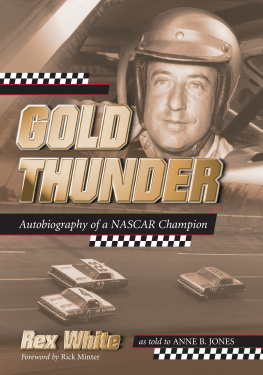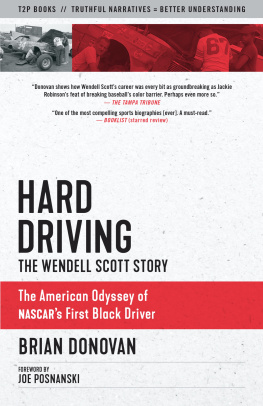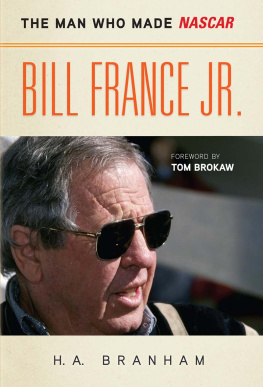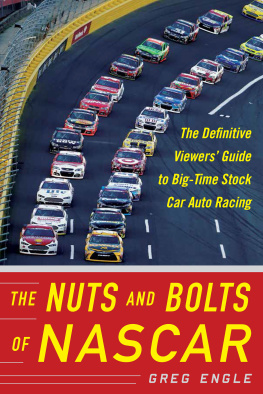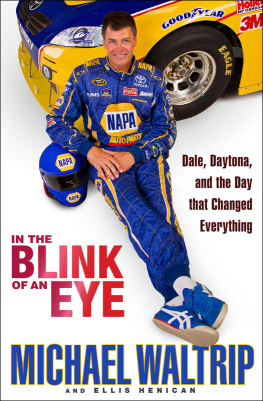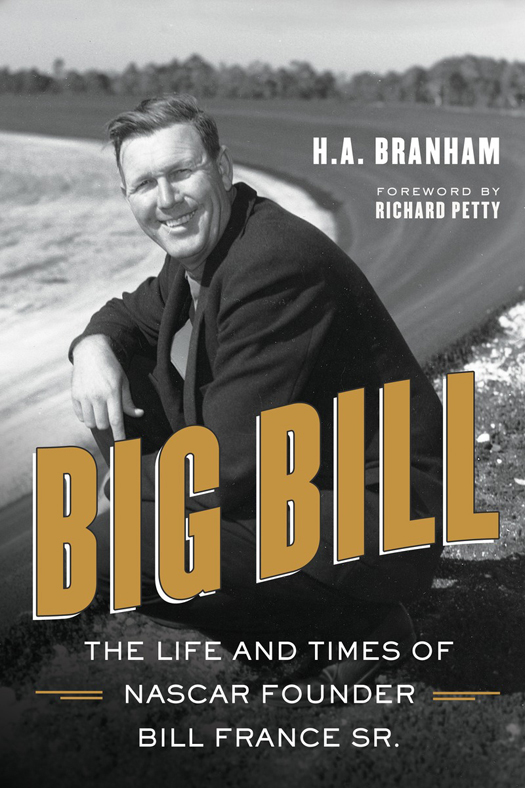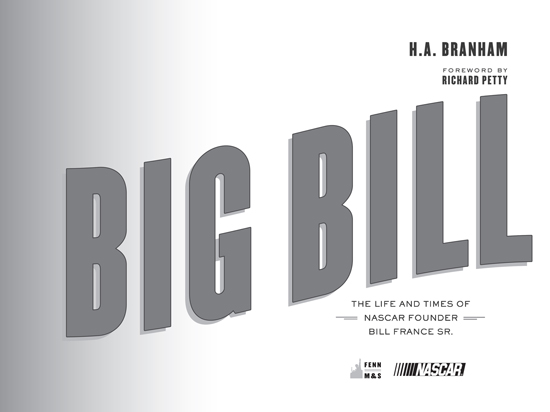Copyright 2015 by the National Association of Stock Car Auto Racing, Inc
Fenn/McClelland & Stewart is an imprint of McClelland & Stewart, a division of Random House of Canada Limited, a Penguin Random House Company
Fenn/McClelland & Stewart and colophon are registered trademarks of McClelland & Stewart, a division of Random House of Canada Limited, a Penguin Random House Company
All rights reserved. The use of any part of this publication reproduced, transmitted in any form or by any means, electronic, mechanical, photocopying, recording, or otherwise, or stored in a retrieval system, without the prior written consent of the publisher or, in case of photocopying or other reprographic copying, a licence from the Canadian Copyright Licensing Agency is an infringement of the copyright law.
Library and Archives Canada Cataloguing in Publication is available upon request
ISBN: 978-0-7710-1767-4
ebook ISBN: 978-0-7710-1768-1
Published simultaneously in the United States of America by Fenn/McClelland & Stewart, a division of Random House of Canada Limited, a Penguin Random House Company
Library of Congress Control Number is available upon request
Designed by Five Seventeen
Photos from France Family collection
Fenn/McClelland & Stewart, a division of Random House of Canada Limited, a Penguin Random House Company
www.penguinrandomhouse.ca

v3.1
William Henry Getty France was a leader, a dreamer, a visionary, a man of extraordinary will and purpose.
But more than anything else, first and foremost he was a husband and a father. And so this book is dedicated to his wife, Anne Bledsoe France the beloved Annie B. and their two sons, William (Bill Jr.) Clifton France and James (Jim) Carl France.
CONTENTS
FOREWORD
By Richard Petty
B ill France Sr.?
Well, lets just say he ran the show.
It was his show and I think everybody that raced in NASCAR for him knew it was his show. That meant that when he said this is the way its going to be, you knew there wouldnt be any arguing about it and that there wouldnt be any second thoughts.
I never really had any problem with that myself, but he and my daddy, Lee Petty, they sure crossed swords a few times.
But you know what? In the long run, when you look back, everybody knows that things had to be that way to keep NASCAR operating smoothly.
Being NASCAR was a new business and all, it needed a strong dictatorship, per se. And again, in retrospect, that was a good thing. No matter what the rules were or what went down in a particular circumstance, Bill Sr. was always looking at things from the perspective of what was best for racing in the future, not from a you or me perspective. Let me tell you, he was one forward-thinking, future-thinking individual.
He had to be that way, you know? He had to be thinking about the future when he and a bunch of guys started NASCAR. Then he goes out 10 years later and builds Daytona International Speedway and has the first Daytona 500. Everything he and his family had was 100 per cent into NASCAR. If Daytona had fallen flat he wouldve been out of business, but Bill Sr. didnt mind gambling on something he really believed in and he most certainly believed in that speedway and in NASCAR.
Bill France Sr., Bill France Jr., and now Brian France all the right guys at the right time. Bill Sr. got NASCAR started and put a real strong base under everything. Bill Jr. grew up with his dad and so he understood that part of the business, the importance of having that strong foundation.
Bill Jr. took over as NASCAR president from his father in 1972, and by then NASCAR had really grown. But Bill Jr. wasnt really a completely new generation in terms of his approach; maybe we should call him one-half to two-thirds of a new generation, because he saw things that Bill Sr. didnt do and acted accordingly; and he also saw things Bill Sr. did do and kept them intact. But Bill Jr. took the sport from Step 1 to Step 2, for sure.
Then Brian France came along, the third-generation leader of NASCAR, and he really did symbolize a completely new generation in terms of approach. When he came in he brought a whole new generation of thought compared to Bill Jr., who came in with a half generation of new thought. You hear me?
But make no mistake, it all started with Bill Sr., and one thing he was really smart about was PR. The best example was that very first Daytona 500 in 1959. We had a famous finish between my daddy and Johnny Beauchamp. Well, they finished side by side and Bill Sr. knew my daddy had won. But he said to himself, Looky here, this thing is close enough that we can argue about it for two or three days, and thats what happened, until Bill Sr. announced on Wednesday that Lee Petty had won. If he had made that announcement right after the race, that wouldve been it and come Monday the interest in the first Daytona 500 wouldve been over with. But instead we had to wait and wait, and by the time Wednesday rolled around the whole country was waiting to see what was going to happen. The new Daytona International Speedway race track all of a sudden was humungous in the public eye.
Talladega Superspeedway turned out to be a good PR deal too, when the drivers boycotted the first-ever race there in 1969 because of safety concerns and Bill Sr. put together a field and ran the race anyway. That was the best thing ever for Talladega because before that nobody had ever heard of Talladega, Alabama. You had everybody looking at a map just trying to find out where Talladega was. So, we had all that fallout about the boycott lasting really strong for a couple of weeks. It put Talladega on the map.
Looking back, you can see Bill Sr. really put his mark on NASCAR initially and by doing that, he had complete control of what he thought was going to be the best thing for NASCAR.
Like in 1949, the very first Strictly Stock race (the forerunner of todays NASCAR Sprint Cup Series) at Charlotte, he disqualified the winner because of illegal parts! And then, in 1950, he took a bunch of points away from my daddy and a couple others because they ran in some non-NASCAR races on a week off. It mightve cost a couple of them the championship.
Bill Sr. wanted to show people that he had the upper hand, right quick. But I remember that whenever he and my daddy would have a disagreement, my daddy would tell me, Its his ball, his ball game, and its being played on his ball field. If you dont want to play, you can go home. My daddy understood that, and since he was trying to make a living from NASCAR racing, he had to make it work.
I think Bill Sr. would be proud of NASCAR today, proud of the fact his son took it one step further than he did, and proud that his grandson has taken it another step further. Now, he wouldnt have done it the same way, but he wouldve sat back, and told you:
Yeah, I had something to do with all of this.
INTRODUCTION
S o many people have so many stories about Bill France Sr., who in these pages will be referred to mostly as Big Bill or simply, Senior. The stories are absolute gold, the ultimate gateways to NASCARs past. Especially telling is the manner in which some of these stories are told. Bill France Sr. died in 1992, but for those who knew him he seems to live, still.


